I was walking across to the office this morning as the gardeners were spreading out across campus to start work for the day. One of the younger guys must have been left behind, he was running to catch up with some of the others. As he ran along the road, he leaned over and dragged his machete along the tarmac.
For me the sight and sound of the young gardener sharpening his machete immediately reminded me of film of the Rwandan genocide, showing how easily perfectly normal words, sounds and actions acquire hideous new meanings. It really did send a shiver up my spine.
Watching TV in Nigeria requires a fair bit of determination. I get two different NTA channels, one usually showing national output and the other local. But I can’t predict which is going to be on which frequency.
Tonight national programmes were on the really weak frequency, so the picture’s terrible and occasionally fades out to nothing. The local channel was just showing adverts (the same three repeated) and ‘wise sayings’ (accompanied by distorted muzak) for half an hour.
On Sunday night I was bored and restless, so I thought I’d watch Wetin Dey, a new soap made by the BBC World Service Trust in partnership with NTA. I’d guess that NTA’s involvement is pretty much limited to transmitting the programmes as the sound and picture quality are fairly decent, so obviously none of their technical staff have been involved.
While I was waiting for it to come on I caught something more typical of NTA’s output, a government “documentary” (propaganda film) about the joys of Public Private Partnership in the education sector. I had to laugh when they started talking about how PPP had been a great success in the UK and USA.
It was the usual NTA style, almost inaudible sound, looking like it was filmed on somebody’s home camcorder (although I know they use professional equipment) and just reproducing what the ministry of education had told them to say.
The programme concentrated on the Unity Schools, founded back in the 60s/70s as the flagships of Nigerian secondary education. Now they’re crumbling and failing, despite huge amounts of money allegedly being allocated to them. Cut to the Federal Government College in Kwali (near Abuja): roofless classrooms, semi-derelict buildings, half-naked students, etc. Then cut to the principals office: she’s sitting there in a big shiny chair, office obviously recently redecorated and a big air-conditioner on the wall. She complains that the college’s generator has broken down, but I can guarantee that there’s a generator just for her office. I’d guess that a reasonable chunk of the money for refurbishing the school has been spent on her office, as well as being siphoned off by all the people higher up the chain.
In fact this documentary kept mentioning how much of the federal budget is spent on education and how poor the schools’ infrastructure is, without once coming close to asking where the money has gone. Instead it went on about how all these problems would be magically solved by bringing in the private sector.
One of the things that still surprises and annoys me is how few people here see it as corruption when the big oga is sitting in a comfortable, air-conditioned office with satellite TV and fridges when the rest of the institution is falling apart. It’s one of the reasons I like working at NTI, we don’t have that sharp divide.
On Saturday I finally got round to starting another one of my little projects: making a Kaduna bus map. Around 11am I set off from NTI to take each of the bus routes around the city and log the stops on my GPS.
I think quite a few of the drivers and conductors were fairly bemused by this baturi sitting in the front of the bus, scribbling notes in a little black book and occasionally pressing buttons on an odd blue device wedged under the windscreen.
Before I boarded the first bus I was hanging around at Kawo and saw a train approaching, with a single goods van behind the locomotive.
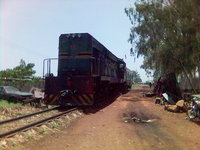
In the end I visited various parts of Kaduna I’d never been to before and gathered enough data to make the map. Now I just need to spend some time drawing it.
The last trip of the day was out to the end of Mando. I strolled back through the edge of town and had some suya for dinner. As I was walking along the road I saw this sign:
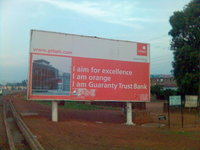
Just what everyone looks for in a bank: orangeness!
I just got back on Sunday from a two-week holiday back home. This was partly to get away from the elections in Nigeria, partly to attend my nephew Joseph’s first birthday party and also just as a holiday.
The KLM flight from Abuja to Amsterdam (via Kano) was comfortable enough. They have video on demand in economy on their new A330s, so I could occupy my night by watching films and TV shows. I’d used the online check-in to choose an exit row seat, so I had plenty of legroom.
Mum and Dad were waiting for me at Edinburgh, along with my niece Eve. She was a little bit shy at first, but remembered me from October and was soon chatting away.
I spent the first week in Stirling, at Mum and Dad’s. The pictures of Eve and Joseph are from the day Mum and I took them to a wildlife park. Eve is wearing a hedgehog mask on top of her head and Joseph is very good at serious looks.
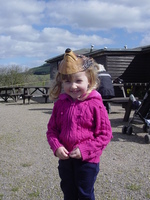

(more…)
I was in Abuja at the weekend and had to stay for a meeting on Monday. As it turned out Monday was a public holiday (announced on Friday), so the meeting was moved to Tuesday. A whole day to hang around in Abuja, marvellous!
Karen and I occupied some time by going to the cinema, to see The Last King of Scotland. This was at Abuja’s (fairly) new cinema inside Ceddi Plaza, operated by a subsidiary of South African company Nu Metro. It’s just like a real cinema although we were reminded we were in Nigeria when the power went off twice and we had to wait for somebody to go and start the generator.
The film itself was very good. From a VSO perspective it’s interesting to see the changes in Nicholas Garrigan’s outlook, as shown through the use of colour and music in the film. He starts off thinking everything is lovely, colourful and full of life and has little tolerance of the more cynical outlook of Sarah Merrit.
Forest Whitaker as Amin is incredible, convincingly showing both the charm and menace of the man. Too many films turn those kind of characters into comic-book bad guys, without showing how it is that they manage to attract their followers.
(Stop here if you’ve not seen the film and don’t want to spoil the ending) (more…)
A few weeks ago Aliyu, who used to clean my office and who seems to have been redeployed to gardening, appeared in my office and handed me an invitation to his wedding.
On Saturday I put on one of my Nigerian outfits, including an appropriately Northern hat, and crossed the road to Barikalau, where the wedding was taking place. Barikalau is a dusty and spread out village directly across the expressway from NTI, many of our staff live there.
I took an okada because I didn’t know the street. Of course it turned out that the rider didn’t either and he spoke no English at all. We eventually found a large crowd of men, sitting in the shade on mats up against a wall.
I joined some of the other NTI staff and eventually Aliyu himself (in the pink outfit, see how the wrapping paper on my present matches) came and sat with us:
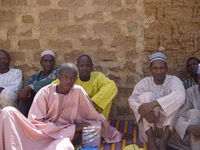
After a while some people handed out bags of pure water and then a little later kola nuts, sweets and dates. Some prayers were said and that was it.
It seems that somewhere indoors the representatives of the two families were making the formal agreement over the marriage and bride price, the groom isn’t involved. One of my colleagues explained that the women had been having separate ceremonies for a few days by this time, which sound much more fun.
Aliyu even got one of his brothers to give me a lift back to NTI, a little over half an hour after I’d left.
The other night Suleiman came round to show me how to cook tuwon shinkafa. This is a popular staple food in northern Nigeria, one of the many different types of starchy blob. Shinkafa is the Hausa word for rice and tuwo is the generic term for starchy blobs.
It’s always eaten with some kind of soup (i.e. stew), in this case we made a sort of egusi soup, with ground pumpkin seeds. I’d been to the market and bought shinkafan tuwo (tuwo rice) and all the other ingredients the day before.
Here’s Suleiman cooking the soup and the finished product:
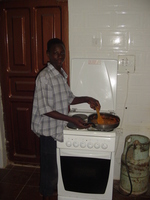
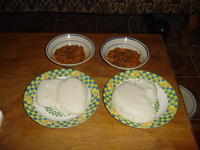
It came out well, although the rice could have probably done with a little more cooking to form into balls properly. I don’t often buy meat or fish, as I can’t rely on my fridge to keep food for very long, so the egusi soup had tinned tuna in instead.
The next day I realised Suleiman had probably added too much chili, I suffered from a distint burning sensation (as Marebec would put it).
I got a text from Aine last week with details of what to do on arrival in Minna. I texted back and asked if she’d meant to send it to someone else. It seems that she had asked me at the St Patrick’s celebrations the week before if I wanted to come through and I’d said yes, maybe too many Guinnesses had been consumed.
After the usual bouncy and dusty trip from Kaduna I arrived and met Aine, Thessa, Jenny and Pete at Mr Biggs for breakfast. Then we headed out to Gurara Falls to cool down in the waterfall. Julia was a bit delayed coming across from Jos, so met us at the falls.
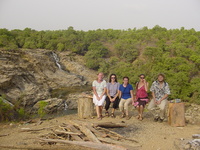
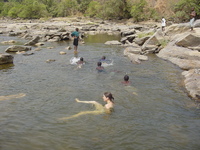
We had a lovely time, although the rocks and sand were a bit too hot to spend any time lingering at the side of the water. As there hasn’t been any rain for quite a while now there wasn’t much water, so you couldn’t really swim but it was marvellous just floating and cooling off.
After a while a group of small boys appeared (they always do) and alternated between doing their own thing and watching us. Doing their own thing seemed to mostly be paddling and catching very small fish. The watching was especially intense when we were leaving and the girls were getting changed, there’s no link between staring and rudeness in Nigerian culture.
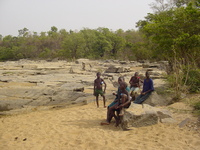
In the evening we had a few beers and some suya at the barracks, about the only place in Minna to get alcohol. The heat was terrible, even after the sun had gone down.
While my laptop is broken my options for entertainment here are limited. I’ve finished all my books, read my newspapers and got bored of playing solitaire.
So I was watching local TV and saw a Gilette advert, dubbed into Pidgin, with the slogan “Na be de best for all correct guys dem”.
![[Nigeria]](/media/Flags/NGflagSmall.png)









